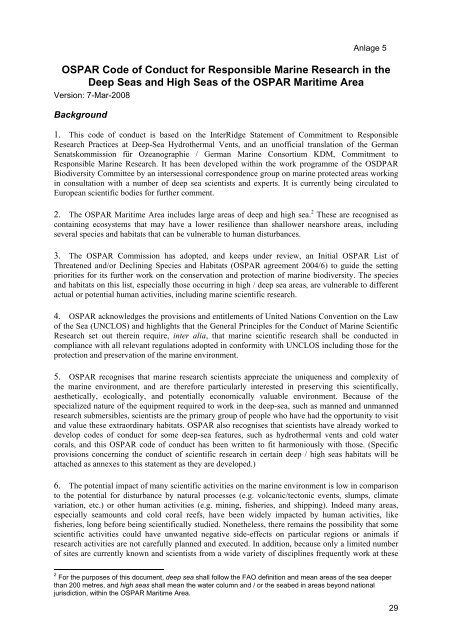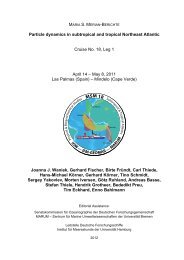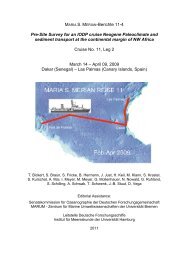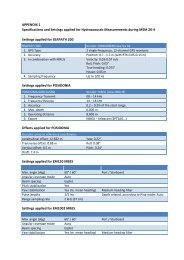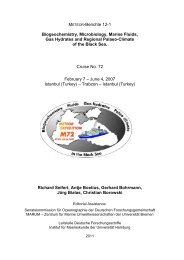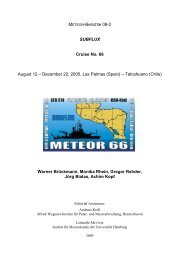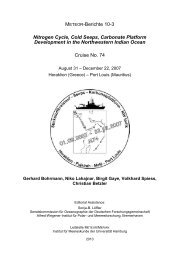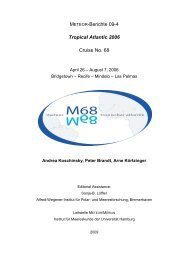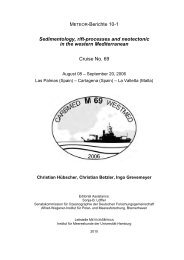LEITFADEN zur Vorbereitung und Durchführung von Expeditionen ...
LEITFADEN zur Vorbereitung und Durchführung von Expeditionen ...
LEITFADEN zur Vorbereitung und Durchführung von Expeditionen ...
Sie wollen auch ein ePaper? Erhöhen Sie die Reichweite Ihrer Titel.
YUMPU macht aus Druck-PDFs automatisch weboptimierte ePaper, die Google liebt.
OSPAR Code of Conduct for Responsible Marine Research in the<br />
Deep Seas and High Seas of the OSPAR Maritime Area<br />
Version: 7-Mar-2008<br />
Backgro<strong>und</strong><br />
Anlage 5<br />
1. This code of conduct is based on the InterRidge Statement of Commitment to Responsible<br />
Research Practices at Deep-Sea Hydrothermal Vents, and an unofficial translation of the German<br />
Senatskommission für Ozeanographie / German Marine Consortium KDM, Commitment to<br />
Responsible Marine Research. It has been developed within the work programme of the OSDPAR<br />
Biodiversity Committee by an intersessional correspondence group on marine protected areas working<br />
in consultation with a number of deep sea scientists and experts. It is currently being circulated to<br />
European scientific bodies for further comment.<br />
2. The OSPAR Maritime Area includes large areas of deep and high sea. 2 These are recognised as<br />
containing ecosystems that may have a lower resilience than shallower nearshore areas, including<br />
several species and habitats that can be vulnerable to human disturbances.<br />
3. The OSPAR Commission has adopted, and keeps <strong>und</strong>er review, an Initial OSPAR List of<br />
Threatened and/or Declining Species and Habitats (OSPAR agreement 2004/6) to guide the setting<br />
priorities for its further work on the conservation and protection of marine biodiversity. The species<br />
and habitats on this list, especially those occurring in high / deep sea areas, are vulnerable to different<br />
actual or potential human activities, including marine scientific research.<br />
4. OSPAR acknowledges the provisions and entitlements of United Nations Convention on the Law<br />
of the Sea (UNCLOS) and highlights that the General Principles for the Conduct of Marine Scientific<br />
Research set out therein require, inter alia, that marine scientific research shall be conducted in<br />
compliance with all relevant regulations adopted in conformity with UNCLOS including those for the<br />
protection and preservation of the marine environment.<br />
5. OSPAR recognises that marine research scientists appreciate the uniqueness and complexity of<br />
the marine environment, and are therefore particularly interested in preserving this scientifically,<br />
aesthetically, ecologically, and potentially economically valuable environment. Because of the<br />
specialized nature of the equipment required to work in the deep-sea, such as manned and unmanned<br />
research submersibles, scientists are the primary group of people who have had the opportunity to visit<br />
and value these extraordinary habitats. OSPAR also recognises that scientists have already worked to<br />
develop codes of conduct for some deep-sea features, such as hydrothermal vents and cold water<br />
corals, and this OSPAR code of conduct has been written to fit harmoniously with those. (Specific<br />
provisions concerning the conduct of scientific research in certain deep / high seas habitats will be<br />
attached as annexes to this statement as they are developed.)<br />
6. The potential impact of many scientific activities on the marine environment is low in comparison<br />
to the potential for disturbance by natural processes (e.g. volcanic/tectonic events, slumps, climate<br />
variation, etc.) or other human activities (e.g. mining, fisheries, and shipping). Indeed many areas,<br />
especially seamounts and cold coral reefs, have been widely impacted by human activities, like<br />
fisheries, long before being scientifically studied. Nonetheless, there remains the possibility that some<br />
scientific activities could have unwanted negative side-effects on particular regions or animals if<br />
research activities are not carefully planned and executed. In addition, because only a limited number<br />
of sites are currently known and scientists from a wide variety of disciplines frequently work at these<br />
2 For the purposes of this document, deep sea shall follow the FAO definition and mean areas of the sea deeper<br />
than 200 metres, and high seas shall mean the water column and / or the seabed in areas beyond national<br />
jurisdiction, within the OSPAR Maritime Area.<br />
29


